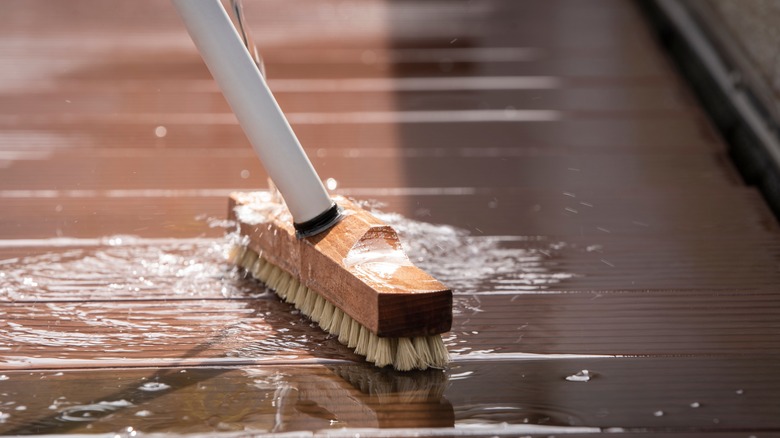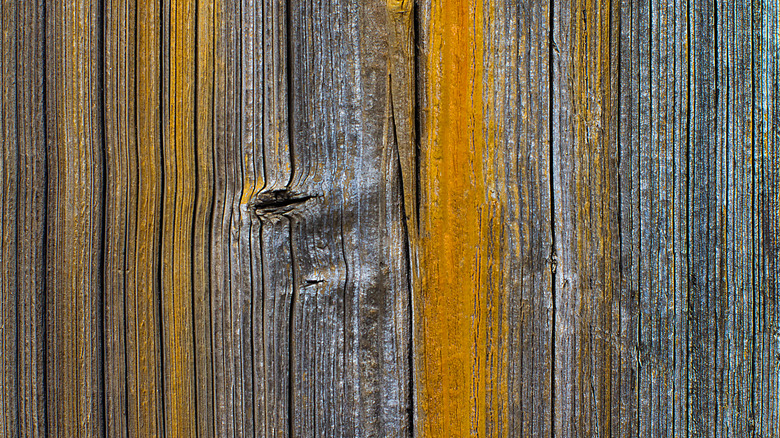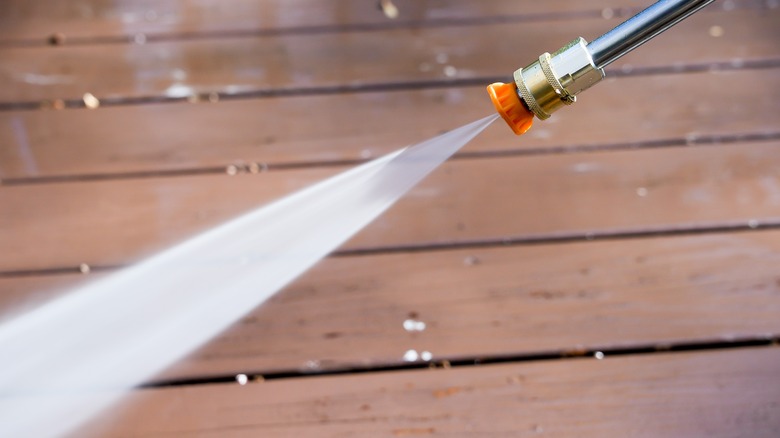Here's How To Safely Remove Rust Stains On Your Deck
The deck is the focal point of your outdoor oasis — one that should complement the natural surroundings with an organic look. But all decks, whether real or composite wood, are a magnet for all sorts of unsightly stains that completely ruin the aesthetic. Mold, algae, and rust are all common enemies of outdoor decks, and the elements play a major role in their presence. Rust stains on wood decking may be tough to deal with because the iron oxide that stems from the corrosion process can seep deep into the fibers of the wood and require aggressive cleaning methods. Also, not all decking materials can withstand cleaning chemicals well, so your cleaning agent options are usually limited, too.
Fortunately, there are several cleaning products and tricks you can use to remove rust stains from a deck. Which one you choose depends on the deck boards' material. For example, deck brighteners tend to fight rust well on most natural wood decks, whereas natural cleaning ingredients like vinegar work wonders on composite materials. Below, we'll explain the common causes of rust on decks, walk you through different cleaning methods for composite and wooden boards, and share a few strategies for keeping rust from reemerging.
Why rust stains appear on wooden deck boards and how to remove them
If your wooden deck was installed with the wrong fasteners, or the fasteners' protective coating wore off after years of use, you may find black spots next to the nails on the boards. These black spots are actually rust. Non-galvanized fasteners (or their galvanized peers whose coating is gone) corrode when exposed to moisture. The resulting iron oxide seeps into the wood fibers and turns them black. Fasteners are not the only culprits, and you may find black spots next to metal furniture or other outdoor metal items that corroded and bled rust into the wooden deck boards.
Any rust-removal steps you take will produce short-lived results if the source of iron oxide remains on the deck. So, if the rust appears around the nails, you'll have to face the gargantuan task of refastening the deck with galvanized hardware appropriate for outdoor use before treating the rust stains. Likewise, you should remove any rusting metal items before cleaning the stains they left — otherwise, the blemishes will soon reappear.
Once the source of rust is gone, you can go after the stains themselves. Start by washing the affected area, then use a deck wood brightener to treat the rust residue according to the manufacturer's instructions. If the stains are stubborn, you may have no choice but to sand the rusty spots.
What to do if rust gets on your composite decking
If your deck is made of a composite material instead of wood, you're in luck. Composite decking is made of polymer with wood fibers embedded in the plastic. This materiality makes composite decks more resistant to stains and moisture, and you don't need to apply sealants or stain these decks to protect them from the elements. When rust gets on the composite deck boards, the removal procedure is far less arduous than what real wood decks demand.
To clean rust out of a composite wood deck, you just need an effective way to get the iron oxide residue off its surface. The cleaning agent you use should depend on the severity of the stain. Start by trying a mild cleaner, like dish soap. Simply apply some soap to the stain, pour a bit of water on it, and scrub the deck with a brush or sponge. If the rust stain doesn't budge, a common household ingredient like vinegar mixed with water in a half-half solution can be the answer. Apply the mix to the rust stain, then scrub away — the stain should lift after a while. If the rust is particularly stubborn, power-washing the deck should do the trick.
Despite its innate robustness, composite decking doesn't stand up well to strong chemical cleaners. These chemicals can stain the composite material or damage its texture. To avoid ruining the deck boards while removing rust, stay away from WD-40, toilet cleaners, and bleach.


